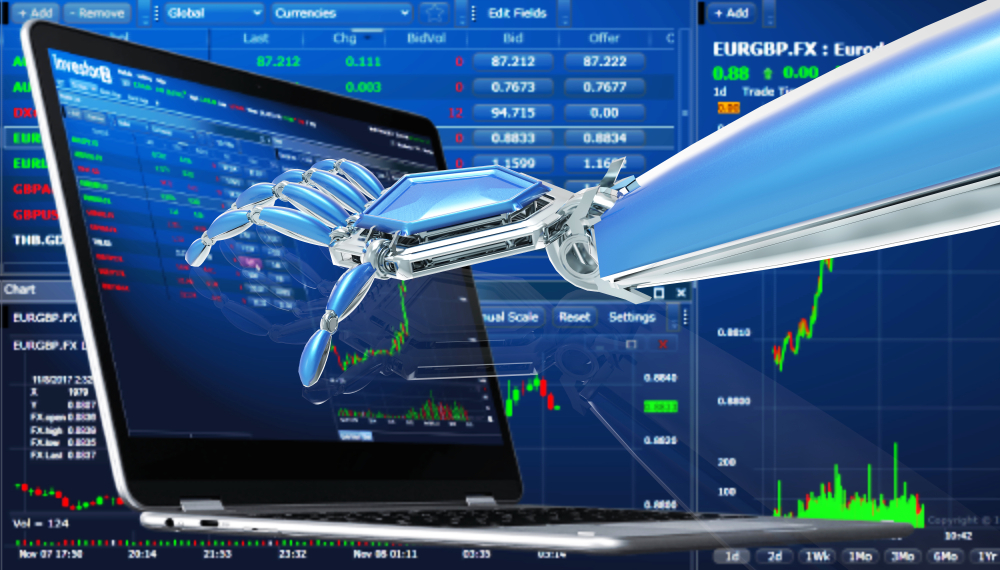Your FX trading will move through natural stages, as you experience a form of trading evolution, during your early months and years. Upon first discovering the retail trading industry, you’ll trade manually, whilst you familiarise yourself with the complexity of all that’s involved. Eventually and perhaps inevitably, your thoughts will turn to the potential benefits of automated trading.

These thoughts generally dovetail with experimentation, relating to the vast array of technical indicators available to you. As you copy (or develop your own) indicator based trading strategies, you’ll begin to consider if you could automate these strategies, in order to become more proficient and profitable. As this curious period of experimentation emerges in your psyche, it could be an excellent point at which to begin investigating the potential benefits of automated trading.
You may have combined a multi indicator strategy that you initially use manually, which you’re convinced indicates market movement in your favour, when the various technical indicators align and chime. You begin to develop thoughts concerning coding these indicators into an expert advisor, in doing so you’ll imagine that manual trading will then become a relic of your past. You’d simply allow your platform and code, to trade on your behalf and effectively and efficiently, bank the profits.
However, the mention of “code” and “expert advisor” illustrates two barriers to using automation; you have to learn basis coding skills and develop an understanding of what expert advisors are. Quite simply the code is the language you’ll use on the platform, the expert advisor is in effect the artificial intelligence robot, which you’ll use to trade on your behalf. It’s often at this stage, when manual, part time traders, will give up on their thoughts of moving to automated trading methods, as they’ll perceive the leap (from manual to automated trading) as too complicated for them to understand and cope with. This conclusion would be both hasty and incorrect, as becoming familiar with basic trading coding, is a far simpler process than the uninitiated would imagine.
Reputable retail FX brokers, will promote market access through an STP-ECN mechanism; straight through processing into an electronic communication network. This non dealing desk, transparent market access is regarded, by many objective market commentators, as the most legitimate trading opportunity available for individual, retail traders. Brokers who offer such access will generally offer their clients one of the MetaTrader platforms, as the only credible platform to trade on and through. MetaTrader’s simple to operate and navigate platforms, also come with added feature and benefits, at no extra cost. Such as; the ability to code your own expert advisors (robots) through their proprietary coding, known as MQSL.
This coding language offers up a tremendous opportunity for novice and intermediate level traders, to become familiar with what’s involved when learning basic coding skills. This unique language is highly respected in the wider FX coding industry and has been deliberately designed to cater for traders of all levels of experience and ability. MetaTrader set about creating a coding method that most traders could understand and apply easily and simply, to their trading methods and strategies.
There are numerous forums dedicated to users of MetaTrader platforms, there are also many forums and help sites, which offer up advice on how to code. Within these forums there are free suites of expert advisors for you to pick and choose from, many of which have been posted up by other traders, on a Creative Commons, open source basis.
MetaTrader users have by accident and design, created their own community, within the industry of retail trading, for the benefit all all traders. Many traders will testify that once they become involved in this area of trading, they quickly leave behind their past and any further thoughts of manual trading. In many ways, they begin to regard trading as an exercise in financial software engineering and computing, rather than a manual operation.
Ironically, once you become involved in this community and method of trading, you’re operating in a manner that institutional level traders would relate to; you’re taking on the demeanour of a quant/analyst/financial engineer, using code to solve simple problems. You’ll concentrate on precision rather than approximation and you’ll view the whole process of your trading, through an entirely different prism.


